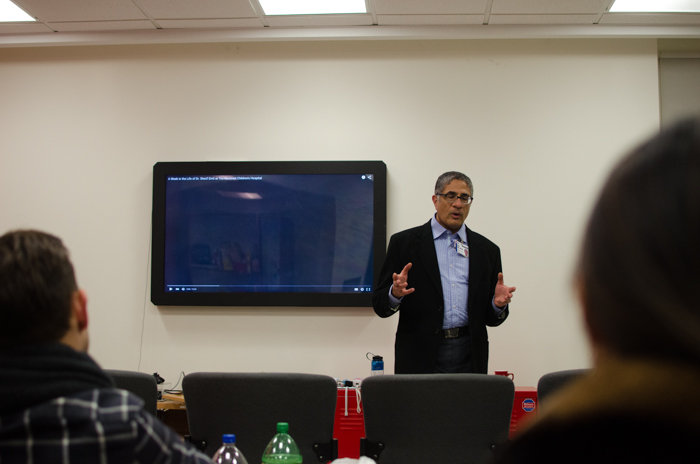On Tuesday, the common lounge in McGill’s Lady Meredith Annex fell silent as Dr. Sherif Emil, director of paediatric general surgery at the Montreal Children’s Hospital took the stage. No stranger to Montreal—Emil completed both his medical degree and paediatric specialization at McGill—his talk had been highly anticipated by current McGill Medical Students.
Emil began his talk by describing why he left Montreal, only to ultimately return. After completing his residency, hoping he’d never have to endure another harsh winter, Emil went to work at University of California Irvine as a paediatric surgeon. However, it seemed Montreal needed Emil more than he realized, and he was invited back to practice paediatric surgery.
“It was really quite a privilege for me to have my mentors–the people who trained me–ask me, ‘Would you come back?’” Emil explained.
At that time, paediatric surgery programs in North America were scarce, and the ones that existed, extremely competitive. When Emil was applying for a residency, there were only 22 programs available. Today ,there are still very few programs in existence, highlighting the continued shortfallings of North American paediatric surgery; however, paediatric surgery residency programs are unique because residency placements can be placed for Canada and the U.S., whereas all other programs require separate submissions for each country respectively. In Canada the match is called the Canadian Resident Matching Service (CaRMS), and in the U.S. it is the National Resident Matching Program (NRMP).
“Paediatric Surgery remains, to this day, the only speciality with a single match for the U.S. and Canada,” Emil said.
But the singularity of paediatric surgery extends beyond just its training programs.
“One thinks of surgery as something with limited to no patient contact,” explained Emil. “But paediatric surgeons are there from the beginning; from the moment the baby—or in some cases the foetus—has been diagnosed [with a problem]. [The surgeon will] follow the patient all the way up to adulthood.”
Because of these interactions, paediatric surgeons must perfect patient contact and care, both as a doctor and as a human being.
“It is truly a privilege to ask a parent to surrender their children for surgery,” stated Emil. “[Because] we, as surgeons, are essentially causing injury to them so that we could heal them.”
Unfortunately, this commitment is sometimes difficult to apply to one’s own life.
“I cannot say I have succeeded in creating a work-life balance,” said Emil. “Most of my family are simply content that I would make an effort to try [to keep in touch].”
Finding this balance is not easy and often requires special attention. But Emil was able to provide attendees some advice about maintaining relationships—with their friends and families and with their patients.
Paediatric surgeons’ relationships with patients are unique, because the patient is a child. This is the blessing and the curse of paediatric surgery—especially when faced with patient mortality. No matter the challenge, a surgeon must face the problem from the perspective of a doctor, while remaining human.
“The most important thing not to do is to shut yourself off and attempt to feel nothing,” Emil explained. “I still get Christmas cards from parents whose children’s funerals I went to.”
Aside from his duties as director of Paediatric General Surgery, Emil is heavily involved in global health initiatives, particularly in Africa, where he is from.
“I grew up in small villages around Nigeria, where my parents were the only doctors 2,000 miles in any direction,” Emil explained. “The goal of global health is to both provide training and build infrastructure, as well as to give these countries hope in bridging the gap between them and developed countries.”
Having witnessed firsthand the issues with healthcare in developing countries, Emil has initiated programs towards creating a more stable healthcare infrastructure. For example, Emil has raised hundreds of thousand of dollars in the creation of advanced surgery clinics in Nigeria. He will be returning to Africa in February, operating on ‘surgical ships,’ which are vessels stationed near shores of conflict zones. They also provide a centre on which satellite clinics can be set up. This human connection was a central and recurring theme in the evening’s talk, it would seem that a passion for humanity defines paediatric surgeons.








